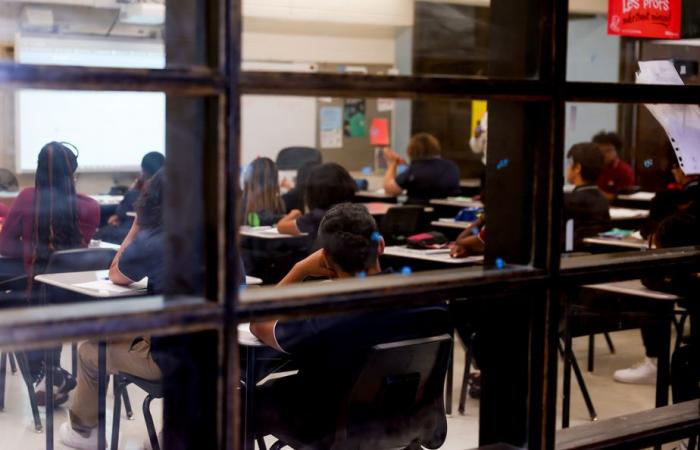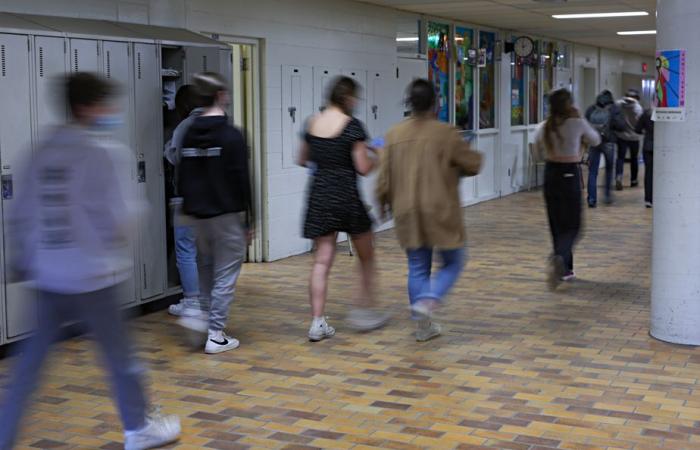Are schools too often sending students home who misbehave in class? Student advocates are concerned that young people are regularly prevented from going to school… by their school, which suspends them. This is a measure that we know is “ineffective”, says a professor.
Published at 5:00 a.m.
In the reports they produced after a year in office, several regional student protectors look at suspensions, often inflicted on students with adjustment or learning difficulties, or with behavioral problems.
“I noticed that it was common for certain schools to resort to periods of stopping schooling, or even part-time schooling schedules with these students,” writes Audrey Parizeau, protector of the Grandes region. -Rivières, a large territory which includes schools on the south shore of the Saint-Laurent, from Lévis to Drummondville, but also from Trois-Rivières.
These students are removed from school while their needs are assessed or to protect their classmates, she continues.
Some educational organizations say they are at the end of their resources. The fact remains that all students, regardless of the events in which they may be involved, have the right to education.
Audrey Parizeau, student protector of the Grandes-Rivières region, in her report
She’s not the only one worried about those missed school days. The case of a student with several learning difficulties who was suspended “for an indefinite period” is notably reported by the protector of the Marée-Montante region. The student only had a few hours of distance learning per week.
Another protector writes that “during certain more or less long periods, [des] students whose well-being and mental health were affected were deprived of their right to attend school.”
Non-existent data
How many students per year are expelled from their school, and for how long? The Department of Education does not keep data on suspensions, but The Press obtained data from the Montreal School Service Center (CSSDM), the largest in Quebec.
After non-compliance with the code of conduct, which is the main reason for suspension, it is acts of physical and then verbal violence which lead to the exclusion of students from school. This is followed by intimidation, theft or vandalism, illegal possession, cyberbullying and sexual violence.
The duration of suspensions ranges from one day to “five days or more”.
In some secondary schools in this service center, the number of suspensions varies greatly depending on the year, but it has generally decreased between the 2022-2023 and 2023-2024 school years.
At the Pointe-de-l’Île school service center, the number of suspensions has also decreased since 2018, as has the average number of days of these withdrawals.
Thus, in 2018-2019, students suspended were suspended for an average of 3.14 days. Last year, this duration was 2.78 days.
The CSS Marie-Victorin, on the South Shore, in the Montreal region, did not provide us with the reasons for suspending the students, while the Marguerite-Bourgeoys school service center, the second largest in Quebec, refused to answer us, just like that of Laval.
Suspension, a “reward”
The scientific literature is unanimous, says Vincent Bernier, professor at the faculty of education at the University of Sherbrooke: leaving a student at home is “ineffective”.
“Students will often tend to perceive suspension at home as a reward,” explains the teacher.
PHOTO FRANÇOIS ROY, LA PRESSE ARCHIVES
Students can consider suspension at home “as a reward,” according to Professor Vincent Bernier, but this measure can penalize them in the long term.
The president of the Quebec Federation of Educational Institution Directors (FQDE) is also of this opinion.
-“If the child goes home and the parents supervise and he doesn’t spend his day playing video games, that’s one thing. But that’s not what happens for the majority. It’s a day off for them and they are happier than anything else,” says Nicolas Prévost.
These students who are happy to be at home are nevertheless penalized in the long term and we see an increase in problematic behavior among them, explains Vincent Bernier.
Reduced motivation to learn and lower results are among the negative effects of suspension.
“We will see absenteeism mixed in with that, and sometimes, school regulations mean that after a few days of absenteeism, the student is suspended. It’s quite paradoxical,” observes Mr. Bernier.
Suspension is also “strongly linked” to the risk of dropping out of school.
The professor from the University of Sherbrooke is sorry that we have been talking about school suspensions for at least 30 years and that we know their deleterious effects, but that we have no clear portrait of the students who are suspended.
Vincent Bernier flatly recommends prohibiting the use of the suspension at home without services and that the Public Education Actregulations and school codes of conduct be revised accordingly.
On the ground, we also see that suspending students “doesn’t do much,” says Nicolas Prévost, of the FQDE.
“I know this is the most striking gesture for Mr. and Mrs. Everyone. We have parents who call us to tell us that something happened and we are always asked if the student is going to be suspended. But from experience, I can say that this is not the harshest consequence,” he says.
What works?
Suspensions can also be done “in-house”. The student continues to attend school, but is removed from his group.
“When schools have the means to do it, the physical space and the staff, in many schools we favor this type of consequence,” says Nicolas Prévost, president of the FQDE.
We must be careful not to “park the student,” says Professor Vincent Bernier, who advocates well-structured internal suspension programs.
In this regard, the YMCA’s “Alternative Suspension” program is often cited as an example.
“We are in external suspension, but towards a community resource where the student receives services. These programs have demonstrated their effectiveness. The problem is that they are not very widespread, and it remains in the hands of community organizations which have funding constraints,” says Vincent Bernier.
Read the article “Alternative Suspension Program: at the school of suspended people”
Calling all
Are you a teacher or parent of a child who has already been suspended from school? What do you think of this disciplinary measure? We want to hear from you.
Write to us







